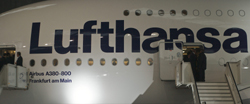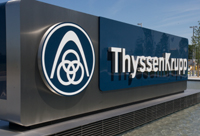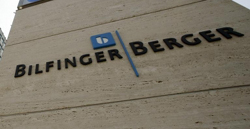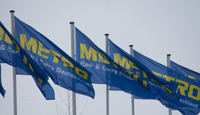VIPsight - December 2011
COMPANIES
Greek bonds put a damper on quarterly balance-sheets
 Chancellor Angela Merkel and French President Nicolas Sarkozy managed at the G20 summit to wring an average 50 percent haircut on Greek government bonds out of the European banks. The bill for the banks’ consent fell due in November; Germany’s number two, Commerzbank, alone had to write 798 million euros off its Greek government bonds in the third quarter, bringing quarterly earnings down to minus 687 million euros. Having written off 760 million euros in the second quarter, the bank has written off a total of 52 percent of the nominal value of its Greek positions in the year 2011 to date. Despite the losses, the Frankfurt bank’s management will not claim State aid again, even if new business has to be temporarily stopped to minimize balance-sheet risks and release capital. The industry leader Deutsche Bank estimates the value depreciation of its Greek bonds in the third quarter at 228 million euros. Deutsche Postbank had in the entire year to date to make adjustments to its Greek papers in the amount of 527 million euros, 341 million in the third quarter alone, meaning they have been written down to 42 percent of their nominal value. Insurers are also affected by the haircut: while Hanover Re got rid of Greek government bonds early and thus avoided losses, even there, as at Munich Re, investment results suffered as a result of declining prices. Allianz had to write off €198 million on Greek bonds, putting them now at 39 percent of nominal value on the Munich firm’s books. The analysis group Open Europe estimates the value of outstanding Greek government bonds in circulation at 355 billion euros. €127 billion of this are held by the European Union, the International Monetary Fund and the ECB. European banks have around €80 billion on their books. The Bundesbank estimates outstanding debt owed German banks in Greece at 28 billion euros. After the haircut, the EU banking authority EBA expects the 70 largest European banks to have a capital requirement of €106 billion, to reach the core-capital ratio of nine percent set by resolution. Four German banks alone are five billion euros short.
Chancellor Angela Merkel and French President Nicolas Sarkozy managed at the G20 summit to wring an average 50 percent haircut on Greek government bonds out of the European banks. The bill for the banks’ consent fell due in November; Germany’s number two, Commerzbank, alone had to write 798 million euros off its Greek government bonds in the third quarter, bringing quarterly earnings down to minus 687 million euros. Having written off 760 million euros in the second quarter, the bank has written off a total of 52 percent of the nominal value of its Greek positions in the year 2011 to date. Despite the losses, the Frankfurt bank’s management will not claim State aid again, even if new business has to be temporarily stopped to minimize balance-sheet risks and release capital. The industry leader Deutsche Bank estimates the value depreciation of its Greek bonds in the third quarter at 228 million euros. Deutsche Postbank had in the entire year to date to make adjustments to its Greek papers in the amount of 527 million euros, 341 million in the third quarter alone, meaning they have been written down to 42 percent of their nominal value. Insurers are also affected by the haircut: while Hanover Re got rid of Greek government bonds early and thus avoided losses, even there, as at Munich Re, investment results suffered as a result of declining prices. Allianz had to write off €198 million on Greek bonds, putting them now at 39 percent of nominal value on the Munich firm’s books. The analysis group Open Europe estimates the value of outstanding Greek government bonds in circulation at 355 billion euros. €127 billion of this are held by the European Union, the International Monetary Fund and the ECB. European banks have around €80 billion on their books. The Bundesbank estimates outstanding debt owed German banks in Greece at 28 billion euros. After the haircut, the EU banking authority EBA expects the 70 largest European banks to have a capital requirement of €106 billion, to reach the core-capital ratio of nine percent set by resolution. Four German banks alone are five billion euros short.
Commerzbank bank swallows Schiffsbank
 Commerzbank will now take over HypoVereinsbank subsidiary Deutsche Schiffsbank fully and integrate it into the corporate group, meaning the bank will lose its traditional name. For the remaining 7.9 percent of the Schiffsbank shares, the Frankfurt bank will according to Financial Times Deutschland pay slightly less than the book value of €70 million. The Schiffsbank equity is 930 million euros. Commerzbank expects savings in the tens of millions.
Commerzbank will now take over HypoVereinsbank subsidiary Deutsche Schiffsbank fully and integrate it into the corporate group, meaning the bank will lose its traditional name. For the remaining 7.9 percent of the Schiffsbank shares, the Frankfurt bank will according to Financial Times Deutschland pay slightly less than the book value of €70 million. The Schiffsbank equity is 930 million euros. Commerzbank expects savings in the tens of millions.
Permira gets rid of Hugo Boss preference shares
Permira subsidiary Red & Black Holding sold around 4.5 million preference shares in fashion group Hugo Boss to institutional investors in mid-November as part of an accelerated bookbuilding process. Financial Times Deutschland speaks of a sales volume of 307 million euros, with which private-equity firm Permira wants to pay off debt. Permira still holds about 88 percent of the voting rights in the suit tailor, and has denied to Financial Times Deutschland that it is trying to cut its involvement in the fashion group Hugo Boss entirely. The total of 66 percent of the shares Permira holds even after the sale have however a lock-up period of only six months. Permira still has some 14.6 million preference shares and 31.6 million common shares. The sale raised the free float of the preference shares to around 57 percent, which will increase both the attractiveness of the stock and its weighting in the MDAX.
Lufthansa subsidiary BMI flies off
 Lufthansa German Airlines is getting rid of its problem subsidiary British Midland Ltd. (BMI). In early November, Germany’s largest airline signed an agreement in principle with British Airways’ and Iberia’s parent International Consolidated Airlines Group SA (IAG) on a takeover of BMI. The partners want to sign the purchase agreement in the coming weeks. The requirements for the transaction to be completed by the first quarter of 2012 are a due-diligence review and antitrust clearance. BMI is active particularly in the UK market and has made a loss of €154 million between January and September on a turnover of €658 million.
Lufthansa German Airlines is getting rid of its problem subsidiary British Midland Ltd. (BMI). In early November, Germany’s largest airline signed an agreement in principle with British Airways’ and Iberia’s parent International Consolidated Airlines Group SA (IAG) on a takeover of BMI. The partners want to sign the purchase agreement in the coming weeks. The requirements for the transaction to be completed by the first quarter of 2012 are a due-diligence review and antitrust clearance. BMI is active particularly in the UK market and has made a loss of €154 million between January and September on a turnover of €658 million.
Corruption watchdog Waigel to go in 2012
It is now five years since the Siemens Munich headquarters was raided on suspicion of corruption. The system of corruption has so far cost the conglomerate more than two billion euros in fines, tax payments and refurbishment costs. Because Siemens was then also listed in the U.S. and had violated exchange rules, the U.S. Securities and Exchange Commission and the U.S. Treasury three years ago called in ex Finance Minister Theo Waigel to monitor corruption at Siemens. As long arm of the U.S. regulatory authorities, Waigel there monitors compliance with relevant rules, initially listing for the U.S. authorities around 200 points in need of improvement. This list eventually shrank to nine points. Waigel has now announced in mid-November to business journalists in Munich that he would resign from his job as compliance monitor in mid 2012 - provided the U.S. gives its approval.
ThyssenKrupp takes a dive
 After news magazine Der Spiegel exposed steel group ThyssenKrupp’s connections to a South Korean trade representative as questionable, the Essen steel giant said it would terminate cooperation with industrial service provider Ferrostaal on the sale of submarines. Financial Times Deutschland reports that negotiations to that effect are currently under way. ThyssenKrupp and Ferrostaal had sold submarines through joint venture Marine Force International (MFI), including to South Korea.
After news magazine Der Spiegel exposed steel group ThyssenKrupp’s connections to a South Korean trade representative as questionable, the Essen steel giant said it would terminate cooperation with industrial service provider Ferrostaal on the sale of submarines. Financial Times Deutschland reports that negotiations to that effect are currently under way. ThyssenKrupp and Ferrostaal had sold submarines through joint venture Marine Force International (MFI), including to South Korea.
Cevian is the new anchor shareholder at Bilfinger Berger
 A few months after the change of CEO, Bilfinger Berger has after many years a new major shareholder again. Cevian is taking over 12.6 percent of the shares, becoming the largest shareholder in the Mannheim-based services and construction group. The financial investor said an increase in the holding is not currently excluded, but they plan no takeover. The share of the fund, specialized in acquisitions of minority interests in listed companies, will not exceed 30 percent. Cevian in summer got out of Demag Cranes, now after a takeover bid majority owned by competitor Terex.
A few months after the change of CEO, Bilfinger Berger has after many years a new major shareholder again. Cevian is taking over 12.6 percent of the shares, becoming the largest shareholder in the Mannheim-based services and construction group. The financial investor said an increase in the holding is not currently excluded, but they plan no takeover. The share of the fund, specialized in acquisitions of minority interests in listed companies, will not exceed 30 percent. Cevian in summer got out of Demag Cranes, now after a takeover bid majority owned by competitor Terex.
Exchange merger slows innovation
The EU Commission’s concerns about the planned merger of Deutsche Börse and NYSE Euronext are according to a Börsenzeitung press report more serious than previously known. The Commission has therefore sent a new questionnaire on the stock-exchange merger. Both exchange operators are to take a stand on the 75 questions contained in the document. About two thirds of the questionnaire relate to the access offered to Eurex Clearing. The authority fears that after the merger competition would be eliminated just here, likely leading to higher fees and less innovation. In the so-called “Statement of Objections,” which was not previously published, the EU Commission compiled its concerns. The deadline for completion of the procedure was lengthened by a further 15 working days. The decision on the approval of the merger will therefore not be taken this year. The last date for the completion of the procedure is 23 January 2012.
KfW acquires 7.5 percent stake in EADS
The government’s entry to the European Aeronautic Defence and Space Company (EADS) is sealed. Daimler intends to conclude a memorandum of understanding on the transaction with the Kreditantalt für Wiederaufbau (KfW) before the end of the year, the carmaker announced on 10 November in Stuttgart. In July 2012, the State development bank is to acquire a 7.5 percent stake in the European aerospace and defence group from the Stuttgart carmaker. The Federal Economics Ministry also confirmed the reports. Daimler holds a total fifteen percent stake in EADS. Germany’s Economics Minister Philipp Rösler based the purchase on the “strategic importance” of the Franco-German joint venture.
MAN, VW subsidiary
The last of the relevant international antitrust authorities, the Chinese competition watchdogs, have now cleared the way for Volkswagen to increase its share in MAN. The transaction was completed on 9 November. The Wolfsburgers now hold 55.9 percent of the truck maker. Closer cooperation between MAN, Scania and Volkswagen should bring about substantial cost savings in purchasing and in development and production. The decision by the Chinese authorities had been widely expected. Brussels in September also had no concerns, and waved the merger through without conditions.
METRO is sticking to REAL
 METRO has stopped the sale of REAL for now. A spokesman told Financial Times Deutschland the company had indeed had talks in recent months with several interested parties for the supermarket chain, and tested options for sales and partnerships. Because of the imminent replacement of Eckhard Cordes, however, the plans would currently not be pursued further. The last remaining bid, from British firm Apax Partners, had also not been attractive enough. Nor was METRO under time pressure in the sale of department-store chain Kaufhof.
METRO has stopped the sale of REAL for now. A spokesman told Financial Times Deutschland the company had indeed had talks in recent months with several interested parties for the supermarket chain, and tested options for sales and partnerships. Because of the imminent replacement of Eckhard Cordes, however, the plans would currently not be pursued further. The last remaining bid, from British firm Apax Partners, had also not been attractive enough. Nor was METRO under time pressure in the sale of department-store chain Kaufhof.















